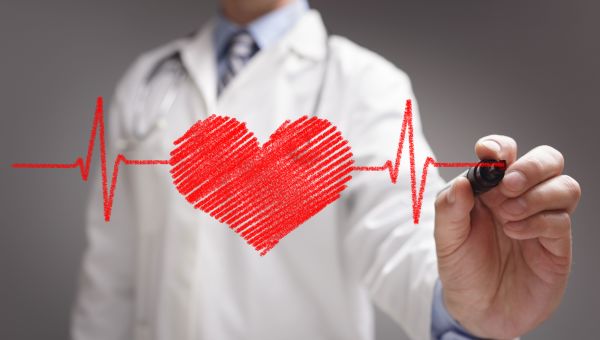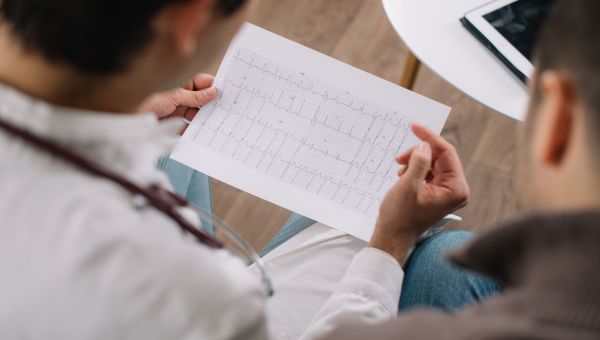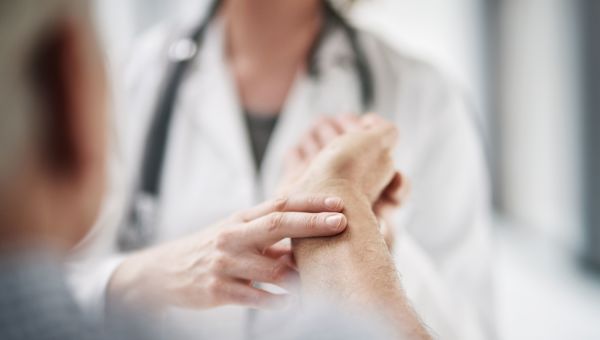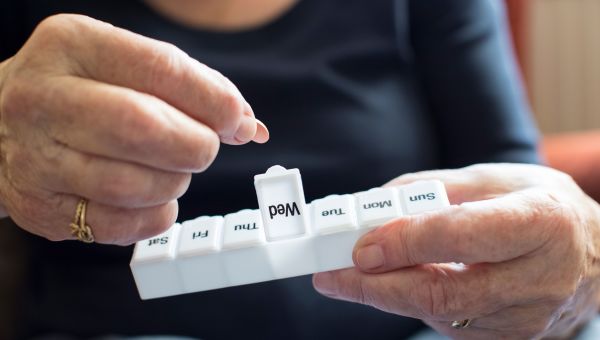Don't go to a cardiologist without knowing this first
Go in prepared and take control of your heart health.

Whether your primary care doctor has discovered worrisome warning signs or already diagnosed a heart problem, a cardiologist can be an essential member of your health care team, helping you treat your heart issues and prevent them from getting worse.
Knowing how to prepare and what to expect when you see your cardiologist is essential to making the best use of your time—and your doctor's. We asked Roger A. Shammas, MD, FACC, a board-certified cardiologist on the staff of Mercy Health in Grand Rapids, Michigan, for guidance about preparing for your first visit.

What to bring
To help your doctor diagnose or treat your heart problem, you should bring several items, including a list of medications. Write down every single prescription drug, over-the-counter medication and nutritional supplement you take, recommends Dr. Shammas. Be sure to include the dosages and whether you take them regularly or occasionally, he adds.
In addition to that list, you should take along:
- A complete list of symptoms, including when you experience them, how long you've had them, how long they last and what you do to relieve them.
- A list of all your allergies, including food, drug and seasonal allergies.
- Results from medical tests, lab work and previous surgeries. This information may be available online. Make sure the cardiologist’s office can access your records before your appointment. If they can't, bring or send copies beforehand.
- A written family history. The American Medical Association has a helpful form you can fill out with health information about your parents, grandparents and siblings. Bring it to your appointment so you have the facts handy.
- A list of all the physicians and other healthcare providers you use and their phone numbers.

Getting settled
During a typical first visit, you’ll encounter several fairly standard procedures and can expect to spend about an hour at the office, says Shammas. After you check in, a nurse, nurse practitioner, physician’s assistant or other personnel may:
- Ask you about your symptoms and the reason for your visit. Think through what you're going to say beforehand and make sure to convey the most important details; it's easy to get sidetracked.
- Take your vital signs, including your height, weight, blood pressure, temperature and pulse.
- Review your current list of medications and supplements.
- Ask you about your health history—and your family’s. “Make sure you know the approximate dates of any previous illnesses, health problems and surgeries you and your family members may have had,” says Shammas. "Genetics can play a role in heart disease."
- Ask questions about your lifestyle. Expect to speak about your eating, sleeping and exercise habits, as well as your tobacco, alcohol and recreational drug use, too, says Shammas.

The Electrocardiogram
“In my office new patients will get an electrocardiogram (EKG),” says Shammas. This painless test takes about 5 to 10 minutes and measures how electrical signals move through the heart; these signals control the heart's rate and rhythm. Fast and simple, the EKG can help detect and evaluate heart attacks and arrhythmias (irregular heartbeats) as well as other heart problems.
To perform the test, a practitioner will place as many as 12 electrodes on your chest, arms and legs. Wires connect the electrodes to a machine that records your heart’s electrical impulses as lines on graph paper—think of the wavy lines of a lie detector test recording. The electrodes stay in place for a few minutes, the recording is made and read and the electrodes are removed. You won’t feel a thing.

The Physical Exam
Before entering the exam room, your cardiologist will likely have reviewed your medical history, vital signs and the results of your EKG. You'll chat about the reasons for your visit, and then, you can expect a physical exam. The exam may include:
Observation: The cardiologist will make sure your skin has good color, meaning that your blood is well-supplied with the oxygen it needs.
Taking your pulse: This is a signal of your heart’s rhythm and regularity and can also reveal signs of heart disease—a weak pulse, for example, could indicate heart problems.
Auscultation: To help detect heart murmurs, diseased heart valves and other concerns, your doctor will use a stethoscope to listen to your heart, lungs and major blood vessels.

The Heart-to-Heart
Once the physical part of the exam is over, you and your cardiologist will discuss what’s going on with your heart. This is your chance to ask questions about your condition, including:
- What caused my problem?
- Do I need additional tests?
- What treatments are available for my problem?
- Should I be taking medications? If so, which ones? And what are their side effects?
- What lifestyle changes can I make to help my condition? Are there any limitations on my activities?
- What symptoms should prompt a call to your office or to 911?
- What is the long-term prognosis for my condition?
For sample questions about specific heart conditions, including heart attacks, angina, heart failure and more, head to the American College of Cardiology, which has a comprehensive list on its website. Make sure to take notes during your session.
Don’t forget—during your discussion, “Be open and honest with your cardiologist,” advises Shammas. Some people are embarrassed to tell the doctor how much they smoke or drink alcohol, or maybe they fib about the amount of exercise they get. And some people may not wish to reveal their current or former use of recreational drugs, he says.
“The cardiologist has to know your habits so that he or she can give you the most accurate diagnosis and create the best treatment plan for you,” he adds.

Moving forward
Depending on your discussion, your exam and your EKG results, your doctor may begin treatment or order additional tests or lab work to further evaluate the health of your heart.
Your next steps? Once you arrive home, make sure to organize all the records and information your doctor gave you. Keep everything in a file to bring with you on future visits, and make sure it stays accurate and up to date by checking it regularly.
You should also:
- Schedule follow-up tests
- Make additional appointments as needed
- Begin any recommended diet, exercise plan or stress reduction plan
- If you're a smoker, ask your doctor to help you develop a plan to quit
- Fill prescriptions and take the drugs as directed
If, after your appointment, you decide you're not satisfied with your cardiologist, keep searching until you find one who fits your needs. Look to your doctor for another referral or try the Find a Doctor function on the Sharecare app, available for iOS and Android.
More On


video

article

slideshow


video


video
